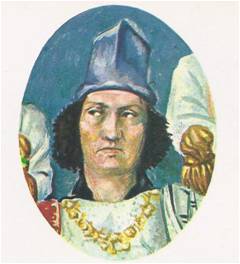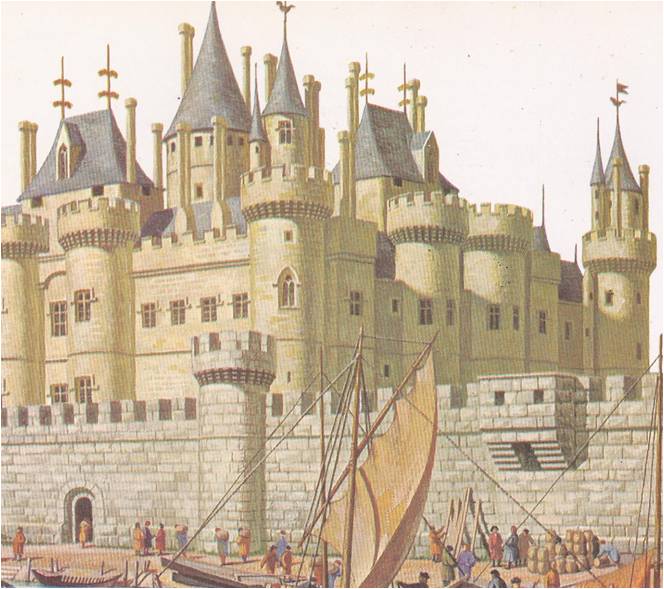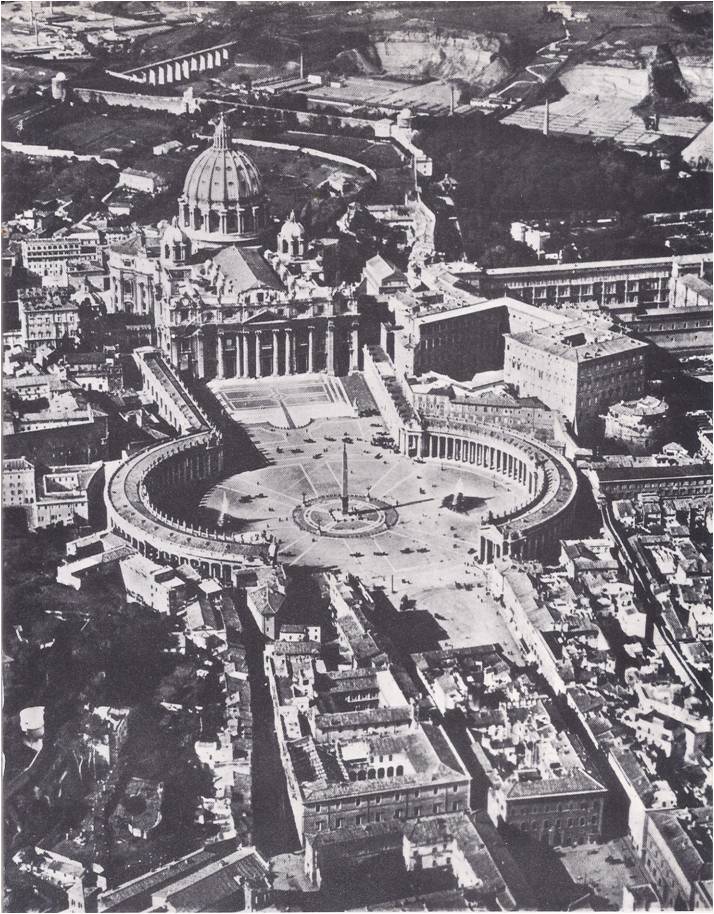WHEN MORE than a century of war between England and France ended in 1453, it was the French king, Charles VII, who was victorious. Although he had driven the English out of France, Charles found himself the king of a sad land. During the wars the great French nobles had fought among themselves as bitterly as they had fought the English and they had become so powerful that they no longer respected their king. France itself was devastated, the people poor and hungry. Paris had been half ruined. Wolves prowled the city by night and twenty-four thousand houses stood empty. Charles worked hard to restore order, setting aside special hours each day for special problems. He organized a permanent army to make himself independent of the nobles, but he found the nobles had no intention of letting him be independent. Many of them rebelled and his own son Louis joined them. Charles died in 1461 and Louis became king — and before long Louis, too, had trouble with the nobles. One great duke, Charles the Bold of Burgundy, even imprisoned Louis in a castle until the king promised to satisfy all the nobles’ demands. After he was freed, however, Louis broke all his promises. He was astoundingly lucky; one by one his greatest rivals died and he inherited their lands. As he gathered in more lands and more power, Frenchmen grew to fear him. They called him the Spider King. Louis’ successors turned to fighting wars in Europe to win new glory for France. Francis I was so successful that he even hoped to be elected the next ruler of the great Holy Roman Empire. He did his best to buy up the votes of the princely electors, but all his gold could not match the riches of the powerful …
Read More »The Renaissance in the North and Spain 1400 – 1598
Through the bustling market-towns of the Low Countries passed the traders, goods and gold of all Europe. Here the luxuries of Asia — spices‚ silks, jewels and perfumes — were exchanged for the practical products of the North — woolen cloth and utensils of iron and copper and wood. In shops and inns, wily Italian shippers and bankers bargained with the solemn, solid merchants from Germany and Flanders — and made the profits that built the Renaissance cities of Italy. In tall-spired cathedrals, in palaces, guildhalls and universities, wandering Italian artists discovered works of art and scholarship as great as any they had known at home. The men of the North had needed no outsiders to teach them about money-making or magnificence. Long before the Renaissance spread across Europe from Italy, they had turned to business, formed the guilds, grown rich and invested their gold in displays of splendour. Flanders was the center of a great cloth-making industry. Germany was the home of expert craftsmen—armourers, goldsmiths and engravers. In Haarlem in the Low Countries, a jack-of-all-trades named Laurent Coster had first thought of using movable carved letters to form words and sentences from which pages could be printed. About 1440, Johann Gutenberg and his assistant Peter Schoeffer had put Coster’s idea to use, made the first printed books and brought about a revolution in learning that changed the history of the world. The northern artists also were inventive and their guildsman patrons kept them as busy as the artists of Italy. Of course, their tastes were not Italian and their paintings and statues, like their ideas, were very different from those in Florence, Milan and Rome. When Masaccio was first teaching the Florentines how to paint figures that “stood on their feet,” the wool merchants of Flanders were buying paintings …
Read More »The Italian Kings of France 1494 – 1590
In all Europe there was no greater admirer of Italy than Francis I, king of France. Francis practiced Italian manners in his court, built Italian palaces in his parks and kept Italian books in his library. He collected Italian paintings and the artists who painted them. Indeed, the king admired Italy so much that he wanted to conquer it all. Francis was not the first ruler to feel these strong Italian longings. In England, Spain and Germany, kings and princes were busily remodeling their courts, their castles and themselves in the Italian manner. Though the little states of Italy were growing poor and weak, it seemed that every richer, stronger nation in Europe was struggling to catch up with them. Actually, it was the Renaissance that Francis and the others were striving to match — the displays of splendour, the well-bred elegance of the courts, the wisdom, and of course, the riches. Western Europe was waking up to the new age, after long years of poverty, confusion and fear brought on by the wars and plagues that destroyed the old world of chivalry. Through the Alps from Italy came an army of peaceful invaders, merchants first, then artists and men of learning. Along with their bolts of wool and Silk, their books and paintings, they brought the Renaissance. The Europeans, gradually stirring with the excitement of the new age, turned to Italy where its wonders had first appeared. Some sent their scholars and artists to Italy to study. Some, like the French, sent their troops. In 1494, little Charles VIII of France clapped a gilded helmet over his shaggy red hair, marched down the peninsula and conquered Naples. For three months he paraded about his new city, while four embarrassed Neapolitan noblemen trotted beside him, holding a golden canopy over …
Read More »Rome, the City of the Pope 1492-1564
In 1492, young Giovanni de’ Medici bade farewell to his father, Lorenzo the Magnificent and left Florence to take his place in Rome among the cardinals of the church. At sixteen, Giovanni was a nobleman in the court of the pope, a man of influence and power. That was fortunate, for when Giovanni was eighteen, his family’s power collapsed. The Florentines drove the Medici from their city and Giovanni, who had come home for a visit, narrowly escaped being stoned by the citizens who once had cheered him. As he crept out of the city, disguised as a poor friar, he swore that he would one day return in triumph. First, he thought, he must look to his career in the church. Whatever the Florentines did, he was still a cardinal and in the papal court there were many ways for a clever man to rise to greatness. When he had crossed the Tuscan border, Giovanni threw off his humble disguise, put on the crimson robes and red hat that marked him as a “prince of the church” and took the road that led to Rome. The young cardinal was not alone in hoping to make his fortune in Rome. Indeed, the old city teemed with ambitious men of every sort — scholars and scoundrels, diplomats and spies, millionaires and fortune-hunters, priests and professional murderers. Rome had known every sort of splendour and evil. Memories of unmatched elegance and unbelievable cruelty lingered in the ruins of temples and arenas built by ancient emperors. Grim fortress-houses were reminders of an age of violence, when the bloody feuds of rival clans of nobles had turned Rome into a ghost city. Now there were new mansions, palaces and lofty churches. A new magnificence had come to Rome with the gold that poured into …
Read More »



